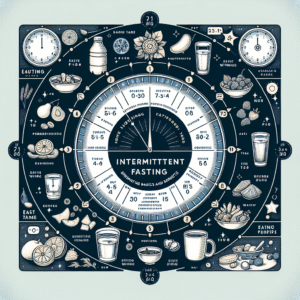Introduction
Intermittent fasting (IF) has gained significant popularity as a dietary approach for weight loss, improving metabolic health, and promoting longevity. Unlike traditional dieting, which focuses on what to eat, intermittent fasting revolves around when to eat. This article explores the basics of intermittent fasting, its various methods, and the benefits it offers.
What is Intermittent Fasting?
Intermittent fasting is a pattern of eating that alternates between periods of eating and fasting. It does not prescribe specific foods but emphasizes the timing of meals. During fasting periods, you either abstain from all food or significantly reduce caloric intake. This eating pattern can be adapted to fit various lifestyles and preferences.
Popular Methods of Intermittent Fasting
Several methods of intermittent fasting have emerged, each with its own unique structure. Here are some of the most popular:
- 16/8 Method: This involves fasting for 16 hours and eating during an 8-hour window each day. For example, you might eat between noon and 8 PM.
- 5:2 Diet: In this method, you consume a regular diet for five days of the week and restrict caloric intake to about 500-600 calories for two non-consecutive days.
- Eat-Stop-Eat: This method incorporates a full 24-hour fast once or twice a week, meaning you would refrain from eating from dinner one day to dinner the next day.
- The Warrior Diet: This involves eating small amounts of raw fruits and vegetables during the day and consuming one large meal in the evening.
Benefits of Intermittent Fasting
Intermittent fasting can offer numerous health benefits, making it an appealing option for many individuals. Here are some key advantages:
Weight Loss and Fat Loss
By limiting the eating window, many people naturally reduce their caloric intake, leading to weight loss. Additionally, fasting increases levels of norepinephrine, a hormone that helps burn fat.
Improved Metabolic Health
Intermittent fasting has been shown to improve insulin sensitivity, reduce blood sugar levels, and lower inflammation, contributing to a healthier metabolic profile.
Enhanced Brain Function
Research suggests that fasting can increase the production of brain-derived neurotrophic factor (BDNF), a protein linked to cognitive function and mood enhancement.
Potential Longevity Benefits
Some animal studies indicate that intermittent fasting can extend lifespan and promote health during aging, although more research in humans is needed.
Cellular Repair Processes
During fasting, cells initiate autophagy, a process where damaged cellular components are broken down and recycled, potentially reducing the risk of various diseases.
Getting Started with Intermittent Fasting
When considering intermittent fasting, it’s essential to evaluate your lifestyle and think about which method will work best for you. Here are some tips for getting started:
- Start Slowly: If you’re new to fasting, consider beginning with a shorter fasting window and gradually extending it.
- Stay Hydrated: Drink plenty of water, herbal teas, or black coffee during fasting periods to stay hydrated and help curb hunger.
- Choose Healthy Foods: Focus on nutrient-dense foods during eating windows, including fruits, vegetables, whole grains, healthy fats, and lean proteins.
- Listen to Your Body: Pay attention to how you feel and adjust your fasting schedule as necessary. If you experience adverse effects, consult a healthcare provider.
Conclusion
Intermittent fasting represents a flexible dietary approach that can promote weight loss and enhance overall health when followed correctly. By understanding the various methods and benefits, individuals can find a fasting routine that suits their lifestyles and health goals. As with any dietary change, it’s prudent to consult with a healthcare professional, especially if you have pre-existing health conditions or concerns.
FAQs
Is intermittent fasting safe for everyone?
While intermittent fasting is safe for many people, it may not be suitable for everyone, including those with certain medical conditions, pregnant or breastfeeding women, or individuals with a history of eating disorders. It’s best to consult a healthcare provider before starting.
Can I drink water during fasting periods?
Yes, water, herbal teas, and black coffee are generally allowed during fasting periods. Staying hydrated is crucial for comfort and well-being while fasting.
Will intermittent fasting help me lose weight?
Many individuals find success with weight loss while following intermittent fasting due to the reduced caloric intake. However, results may vary based on individual factors including adherence and food choices during eating windows.
Can I exercise while fasting?
Yes, many people continue to exercise while practicing intermittent fasting. However, listen to your body and consider your energy levels and recovery needs when scheduling workouts.
What should I eat during my eating window?
Focus on whole, nutrient-dense foods during your eating window. Incorporate a variety of fruits, vegetables, lean proteins, healthy fats, and whole grains to meet your nutritional needs.


















